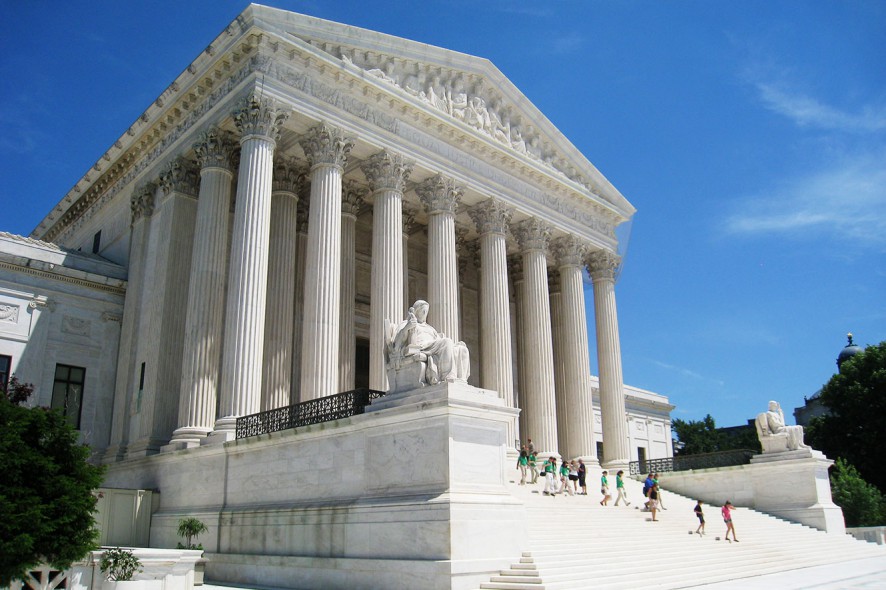Supreme Court of The United States: In a significant decision which can have major repercussions on a woman’s choice to abort in the United States, the full bench of SCOTUS, with a ratio of 5:4, declined to block the Texas law which imposes a near complete ban on abortions. The majority consisted of Amy Coney Barrett, Brett Kavanaugh, Samuel Alito, Neil Gorsuch and Clarence Thomas, JJ.
The Texas Law on Abortion: The instant matter revolved around Senate Bill-8[1] which went into effect on 01-09-2021
- The legislation puts an embargo on the doctors from performing abortions if they can detect a fetal heartbeat, including the cardiac activity that normally occurs at roughly the sixth week of pregnancy[2].
- The law excludes the patient from being sued.
- One of the chief highlights of the legislation is that it delegates the responsibility of the enforcement of the prohibition to the private persons and allows them to bring lawsuits against anyone who provides or aids or abets an abortion – the clinics, doctors and even a cab driver taking a patient to the abortion clinic can become a defendant.
- Anyone who brings a successful suit can collect atleast $10,000 from the person who is found to have infringed the law.
The Legal Trejectory– On May 19th 2021, the Governor of Texas signed the law and it was immediately challenged in the court. After the District Court’s denial to the defendants’ motion of dismissal on Aug. 25, they went to the U.S. Court of Appeals for the 5th Circuit. The Court of Appeals granted the defendants’ request to put the district-court proceedings, on hold, and denied the challengers’ request to expedite the appeal, thereby setting the stage for the challengers to seek emergency relief in the Supreme Court.[3]
Contentions: The State of Texas argued that neither they nor their executive employees possess the authority to enforce the Texas law either directly or indirectly. Furthermore, it is not clear whether, under existing precedent, this Court can issue an injunction against state judges asked to decide a lawsuit under Texas’s law
Per contra, the applicants stated that the Texan law infringes the constitutional right of a woman to obtain an abortion during the first stage of pregnancy and the delegated enforcement of the law on the private persons appears to be a safeguard to protect the State from responsibility for implementing and enforcing the regulatory regime.
Abortion Rights in the United States– In the landmark decision of this Court in Roe v. Wade, 1973 SCC OnLine US SC 20, it was held that a pregnant woman’s fundamental right to choose to have an abortion without excessive governmental restrictions, is part of her Right to Privacy and therefore protected by the US Constitution.
Decades later, the SCOTUS in Planned Parenthood of Southeastern Pennsylvania v. Casey, 1992 SCC OnLine US SC 102 upheld the former decision but placed the “undue burden standard” on the right.
Observations: On behalf of the Majority, Justice Samuel Alito observed that an applicant must carry the burden of making a “strong showing” that it is likely to succeed on the merits, that it will be “irreparably injured absent a stay,” that the balance of the equities favors it, and that a stay is consistent with the public interest. He noted that the applicants in the instant matter have raised “complex and novel antecedent procedural questions”, but they have not carried the aforestated burden. Examining the argument presented by the State of Texas, the Majority refused to issue a stay order on the impugned law. Justice Alito however clarified that this order is not based on any conclusion about the constitutionality of Texas’ law.
Dissenting Opinions: Chief Justice John Roberts along with Justices Stephen Breyer, Sonia Sotomayor and Elena Kagan filed their opinions.
Chief Justice Roberts, considering the contentions raised by the applicants and terming the Texas law to be “unusual, but unprecedented”, observed that he would grant preliminary relief to preserve the status quo before the law went into effect, so that the courts may consider whether a state can avoid responsibility for its laws in such a manner.
Justice Breyer observed that delegation as provided in the impugned law, threatens to invade a constitutional right, and the coming into effect of that delegation will still threaten imminent harm.
Justice Sotomayor noted that, “The Court’s order is stunning”. In a scathing dissent, she stated that the Majority have decided to “bury their heads in the sand” silently consented in a State’s enactment of a law that flouts nearly 50 years of federal precedents. “The Court’s failure to act rewards tactics designed to avoid judicial review and inflicts significant harm on the applicants and on women.”
Justice Kagan noted that the Court’s swift disposal of the matter “greenlights the operation of Texas’s patently unconstitutional law banning most abortions. The Court thus rewards Texas’s scheme to insulate its law from judicial review by deputizing private parties to carry out unconstitutional restrictions on the State’s behalf”.
[Whole Woman’s Health v. Austin Reeve Jackson, No. 21A24, decided on 01-09-2021]
Sucheta Sarkar, Editorial Assistant has reported this brief.
[2] SCOTUS Blog, Texas Abortion Ban
[3] Refer fn. 3






